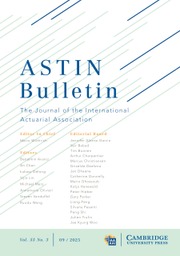Article contents
Estimating the VaR-induced Euler allocation rule
Published online by Cambridge University Press: 02 May 2023
Abstract
The prominence of the Euler allocation rule (EAR) is rooted in the fact that it is the only return on risk-adjusted capital (RORAC) compatible capital allocation rule. When the total regulatory capital is set using the value-at-risk (VaR), the EAR becomes – using a statistical term – the quantile-regression (QR) function. Although the cumulative QR function (i.e., an integral of the QR function) has received considerable attention in the literature, a fully developed statistical inference theory for the QR function itself has been elusive. In the present paper, we develop such a theory based on an empirical QR estimator, for which we establish consistency, asymptotic normality, and standard error estimation. This makes the herein developed results readily applicable in practice, thus facilitating decision making within the RORAC paradigm, conditional mean risk sharing, and current regulatory frameworks.
Keywords
Information
- Type
- Research Article
- Information
- Copyright
- © The Author(s), 2023. Published by Cambridge University Press on behalf of The International Actuarial Association
Footnotes
We are grateful to two anonymous reviewers and the editor in charge of the manuscript for their careful analyses of our theoretical and numerical results, constructive criticism, suggestions, and guidance. This research has been supported by the NSERC Alliance-Mitacs Accelerate grant entitled “New Order of Risk Management: Theory and Applications in the Era of Systemic Risk” from the Natural Sciences and Engineering Research Council (NSERC) of Canada, and the national research organization Mathematics of Information Technology and Complex Systems (MITACS) of Canada.
References
- 3
- Cited by

